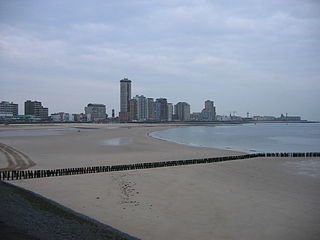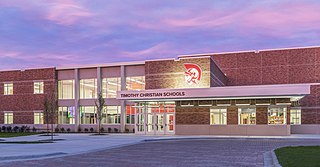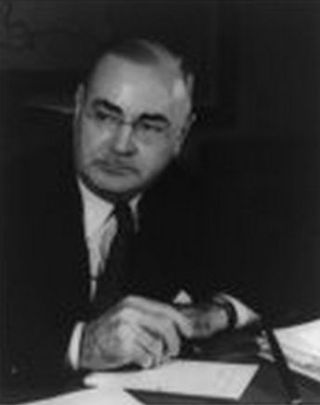Related Research Articles

Holland is a city in Ottawa and Allegan Counties in the western region of the Lower Peninsula of the U.S. state of Michigan. It is situated near the eastern shore of Lake Michigan on Lake Macatawa, which is fed by the Macatawa River. Holland is a thriving city with a diverse economy that includes manufacturing, agriculture, tourism, and higher education. It is home to a number of prominent companies, including Herman Miller, Haworth, and Adient, formerly known as Johnson Controls. The city also attracts thousands of visitors each year for its annual Tulip Time Festival, which celebrates the area's Dutch heritage and vibrant tulip fields.

Vlissingen, historically known in English as Flushing, is a municipality and a city in the southwestern Netherlands on the former island of Walcheren. With its strategic location between the Scheldt river and the North Sea, Vlissingen has been an important harbour for centuries. It was granted city rights in 1315. In the 17th century Vlissingen was a main harbour for ships of the Dutch East India Company (VOC). It is also known as the birthplace of Admiral Michiel de Ruyter.

Philip Danforth Armour Sr. was an American meatpacking industrialist who founded the Chicago-based firm of Armour & Company. Born on a farm in upstate New York, he initially gained financial success when he made $8,000 during the California gold rush from 1852 to 1856. He later opened a wholesale soap business in Cincinnati, then moved it to Milwaukee.

The meat-packing industry handles the slaughtering, processing, packaging, and distribution of meat from animals such as cattle, pigs, sheep and other livestock. Poultry is generally not included. This greater part of the entire meat industry is primarily focused on producing meat for human consumption, but it also yields a variety of by-products including hides, dried blood, protein meals such as meat & bone meal, and, through the process of rendering, fats.

Gustavus Franklin Swift, Sr. was an American business executive. He founded a meat-packing empire in the Midwest during the late 19th century, over which he presided until his death. He is credited with the development of the first practical ice-cooled railroad car, which allowed his company to ship dressed meats to all parts of the country and abroad, ushering in the "era of cheap beef." Swift pioneered the use of animal by-products for the manufacture of soap, glue, fertilizer, various types of sundries, and even medical products.

The Union Stock Yard & Transit Co., or The Yards, was the meatpacking district in Chicago for more than a century, starting in 1865. The district was operated by a group of railroad companies that acquired marshland and turned it into a centralized processing area. By the 1890s, the railroad capital behind the Union Stockyards was Vanderbilt money. The Union Stockyards operated in the New City community area for 106 years, helping Chicago become known as the "hog butcher for the world", the center of the American meatpacking industry for decades. The yards became inspiration for literature and social reform.

Dutch Americans are Americans of Dutch and Flemish descent whose ancestors came from the Low Countries in the distant past, or from the Netherlands as from 1830 when the Flemish became independent from the United Kingdom of the Netherlands by creating the Kingdom of Belgium. Dutch settlement in the Americas started in 1613 with New Amsterdam, which was exchanged with the English for Suriname at the Treaty of Breda (1667) and renamed New York City. The English split the Dutch colony of New Netherland into two pieces and named them New York and New Jersey. Further waves of immigration occurred in the 19th and 20th centuries.

JBS USA Holdings, Inc. is a meat processing company and a wholly owned subsidiary of the Brazilian multinational JBS S.A. The subsidiary was created when JBS entered the U.S. market in 2007 with its purchase of Swift & Company.

Edward Morris was President of Morris & Company, one of the three main meat-packing companies in Chicago.

Boekelo is a village in the municipality of Enschede in the eastern Netherlands, the population is estimated at approximately 2,500. It is located just west of Usselo. The village is known for the Military Boekelo Enschede, an international equestrian event. It is also known for the salt industry, since 1919 located south of the village. This was a reason for the then well-known Bad Boekelo to have a salt water wave pool. After the opening of the Twentekanaal the factory of the Koninklijke Nederlandse Zoutindustrie was moved to Hengelo; currently it is called Nouryon Industrial Chemicals.

Timothy Christian Schools is a private, nondenominational Christian school in Elmhurst, Illinois, founded in 1911.

Elmhurst Christian Reformed Church is a congregation of the Christian Reformed Church in North America located on the southern edge of Elmhurst, Illinois. It was founded in 1924 as a Baptist mission in Bellwood. The founder was a woman who had converted to Christianity after a difficult life in which she was won by her husband in a card game. After moving to Elmhurst in 1964, the congregation flourished and constructed a large new building just off of Roosevelt Road. It remains one of the largest congregations in the Christian Reformed denomination and runs many programs for children, students, adults, and seniors.
Ruth Morris Bakwin was an American pediatrician and child psychologist and the first woman intern at the Fifth Avenue Hospital in New York City. Bakwin and her husband, also a pediatrician, were long associated with New York University School of Medicine.
John Herbert Van Deventer was an American engineer, inventor, trade journal editor, and writer on engineering, management, and accounting. In the field of accounting Van Deventer contributed to the theory of discounted cash flow. During World War I he served as editor-in-chief of the American Machinist.

Engineering Magazine was an American illustrated monthly magazine devoted to industrial progress, first published in 1891. The periodical was published under this title until October 1916. Sequentially from Nov. 1916 to 1927 it was published as Industrial Management.
John Robertson Dunlap was an American journalist, editor and publisher of engineering magazines and books. He is known as founder of the Engineering Magazine in 1891, which in the early 20th century became the "quality magazine in the field of business management."

John Michael Carmody was an American administrator, noted as editor of Factory and Industrial Management, and as administrator of the Rural Electrification Administration and the Federal Works Agency in the 1930s.

Van Vlissingen and Co., founded in 1879, are a privately held full-service commercial and industrial real estate developer, broker, asset and property manager.

Van Vlissingen en Dudok van Heel was a famous nineteenth-century Dutch machine factory. It built steam engines and machinery for the sugar industry and for maritime purposes, as well ships, rolling stock and large metal structures like the Moerdijk bridge and a floating dock. In 1871 it was reorganized to become the public company Koninklijke Fabriek van Stoom- en andere Werktuigen. In a second reorganization in 1890, parts of it were saved and continued under the name Koninklijke Nederlandsche Fabriek van Werktuigen en Spoorwegmaterieel, renamed to Werkspoor in 1927.

Roelof Harms Smit was a Dutch-American minister. Smit ministered a congregation in Drenthe, Michigan in the mid-1800s, which led to a notable secession in the history of the Christian Reformed Church of North America.
References
- 1 2 "Writer Arthur Van Vlissingen : Headed Bureau For Newsweek." in Chicago Tribune, October 22, 1986.
- ↑ Robert P. Swierenga (2002). Dutch Chicago: A History of the Hollanders in the Windy City. 2002, p. 652.
- ↑ Swierenga, Robert (2002). Dutch Chicago: A History of the Hollanders in the Windy City. Grand Rapids, Michigan: Wm. B. Eerdmans Publishing Co. p. 652. ISBN 0-8028-1311-9.
- ↑ Howard P. Segal (2008). Recasting the Machine Age: Henry Ford's Village Industries. p. 6
- ↑ Chandler, Alfred D. "The beginnings of "big business" in American industry." Business History Review 33.01 (1959): 1-31.